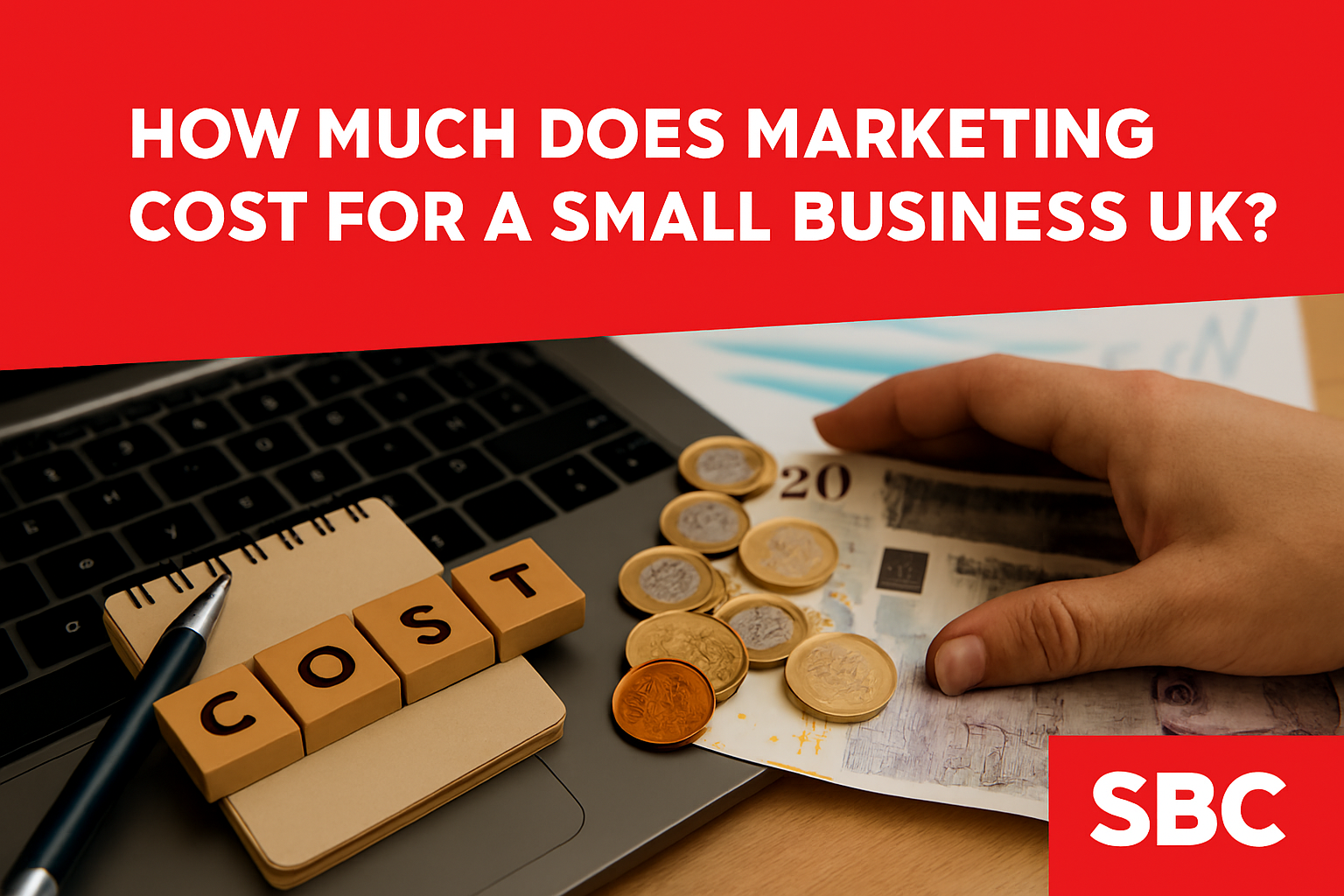Introduction: Navigating Small Business Marketing in the UK
Small business marketing in the UK presents a unique set of challenges that many entrepreneurs face daily. You’re working with tight budgets while competing against established companies that seem to have endless resources. The pressure to make every marketing pound count has never been greater. Yet successful small business marketing isn’t about having the biggest budget—it’s about making intelligent, strategic choices that deliver real results.
Many UK small business owners discover that the most effective marketing campaigns come from creativity and smart planning rather than massive spending. The constraints you face—limited budgets, local competition, and the need to prove ROI quickly—actually create opportunities for innovation. Understanding average marketing costs and focusing on strategies with measurable returns can transform modest resources into substantial growth.
This comprehensive guide will help you navigate the complexities of marketing budgets, understand what other UK businesses are spending, and discover cost-effective strategies that actually work. You’ll learn practical approaches tailored specifically for small businesses, along with insights on how to measure success and avoid common expensive mistakes. SBC Marketing London has helped countless small businesses across the UK overcome these exact challenges through strategic consulting and creative marketing solutions that maximize every marketing investment.
Understanding the Average Marketing Budget for a Small Business UK

Setting a realistic budget for small business marketing requires understanding industry benchmarks and adapting them to your specific situation. Most UK businesses typically allocate between 1% and 10% of their gross revenue to marketing activities, though this range varies significantly based on business maturity, industry sector, and growth objectives. Newer businesses often invest closer to the higher end of this range as they work to establish market presence and customer awareness.
Current research shows that almost half of UK small business owners manage their marketing efforts entirely on their own. While this DIY approach can save money initially, it often leads to missed opportunities and inefficient spending. The key insight here is that “average” serves as a starting point rather than a rigid rule. Your ideal marketing budget should align with your specific business goals, customer acquisition costs, and competitive environment.
What makes a marketing budget truly effective? An ideal budget delivers measurable return on investment while supporting your long-term growth strategy. It should be flexible enough to adapt when market conditions change or when certain campaigns outperform expectations. Consider factors like your sales cycle length, customer lifetime value, and the competitive intensity in your market when determining your allocation.
The 70-20-10 rule offers a practical framework for budget allocation that many successful UK small businesses follow. This strategy directs 70% of your marketing budget toward proven, reliable channels that consistently generate results. Another 20% goes toward testing new approaches and emerging opportunities. The remaining 10% is reserved for experimental initiatives that might unlock significant future growth.
How might this look in practice? A small UK business might allocate the majority of their budget to local SEO optimization and content creation, dedicate a portion to testing new social media platforms or advertising formats, and reserve a small amount for innovative approaches like influencer partnerships or emerging digital tools. This balanced approach ensures stability while encouraging innovation and growth.
Developing a Strategic Marketing Plan on a Budget

Creating an effective marketing strategy starts with deeply understanding your target audience. Research shows that businesses with well-defined target audiences achieve significantly better results from their marketing investments. You need to understand not just who your customers are, but where they spend time online, what content they consume, and what problems keep them awake at night.
Who exactly are you trying to reach? Spend time analyzing UK demographics, online behavior patterns, and customer pain points specific to your industry. This research forms the foundation of every marketing decision you’ll make. Understanding where your potential customers look for solutions helps you focus your limited resources on the channels most likely to generate results.
Competitive analysis plays an equally important role in your strategic planning. Study both local and national competitors to understand their messaging, channel choices, and apparent strategies. This research helps you identify gaps in the market and opportunities to differentiate your business. SBC Marketing London recommends developing a unique selling proposition that clearly articulates why customers should choose your business over alternatives, particularly when competing against larger companies with bigger budgets.
Setting SMART objectives provides the framework for measuring success and justifying your marketing investment. Rather than vague goals like “increase awareness,” establish specific, measurable targets such as “generate 25 new leads per month through website contact forms” or “increase local website traffic by 30% within six months.” These concrete objectives make it easier to track progress and adjust strategies based on performance.
Your marketing plan should document chosen strategies, timelines, estimated costs, and key performance indicators. However, flexibility remains essential. Market conditions change, campaigns perform differently than expected, and new opportunities emerge. Regular monthly reviews allow you to optimize spending, double down on successful tactics, and quickly pivot away from underperforming activities.
Low-Cost Digital Marketing Essentials for UK Small Businesses

Digital marketing offers small businesses unprecedented opportunities to compete effectively without substantial budgets. Your website serves as the foundation of all digital marketing efforts, so ensuring it loads quickly, works perfectly on mobile devices, and provides excellent user experience becomes essential. Basic search engine optimization, including keyword research and on-page optimization, helps potential customers find your business when they’re actively searching for solutions.
Local search optimization deserves special attention for UK small businesses, considering that 46% of Google searches have local intent. Maintaining an up-to-date Google My Business profile dramatically improves your visibility in local search results and Google Maps. Regular updates, customer reviews, and accurate business information help establish credibility with both search engines and potential customers.
Content marketing provides exceptional value for small business marketing budgets. Creating helpful blog posts, detailed guides, frequently asked questions pages, and informative videos positions your business as a trusted expert while attracting potential customers organically. The key is addressing real customer problems and questions rather than simply promoting your products or services.
Storytelling adds emotional connection to your content, making it more memorable and shareable. UK consumers respond particularly well to authentic stories about business origins, customer successes, and behind-the-scenes glimpses of your operations. Repurposing content across multiple formats and platforms maximizes the value of every piece you create.
Social media marketing success depends on strategic platform selection rather than trying to maintain presence everywhere. LinkedIn works exceptionally well for B2B small business marketing, while Instagram and Facebook serve consumer-focused businesses effectively. The statistic that 82% of small businesses don’t maintain social media accounts reveals a significant opportunity for those willing to invest time in building online communities.
Email marketing continues delivering outstanding returns on investment for small businesses. Building a segmented email list allows you to nurture relationships with potential customers over time while staying connected with existing clients. Automated email sequences can welcome new subscribers, follow up with leads, and re-engage inactive customers without requiring constant manual effort. Remember that UK businesses must comply with GDPR regulations when collecting and using customer email addresses.
Offline, Hybrid & Creative Marketing Strategies

Digital marketing dominates most conversations about small business promotion, but offline and hybrid strategies often provide excellent returns, especially for locally-focused businesses. Networking remains one of the most cost-effective ways to generate leads and build business relationships. Local networking events, business associations, and industry meetups provide opportunities to connect with potential customers and complementary businesses face-to-face.
Strategic partnerships with other small businesses can multiply your marketing reach without increasing costs significantly. Consider cross-promotional opportunities, bundled service offerings, or shared marketing initiatives with businesses that serve similar customers but offer different services. These collaborations expand your audience while sharing costs and workload.
Traditional marketing materials still play important roles in professional business development. Well-designed business cards, professional email signatures, and informative brochures provide multiple touchpoints for reinforcing your brand message. Even simple vehicle signage can generate ongoing exposure as you travel throughout your local area conducting business.
Event marketing and public relations offer opportunities to build credibility and generate media coverage without substantial financial investment. Local trade shows, community events, and business exhibitions provide direct access to potential customers. Sharing exhibition space with other businesses reduces costs while maintaining professional presence.
Press releases about significant business milestones, new service launches, or community involvement can generate valuable media coverage. Local newspapers, business publications, and online news sites often welcome well-written stories about local business developments.
Customer loyalty programs and referral incentives transform satisfied clients into active promoters of your business. Research indicates that increasing customer retention by just 5% can boost profits by up to 95%. Simple loyalty schemes, referral rewards, and exclusive offers for existing customers often generate more business at lower costs than constantly pursuing new prospects.
Measuring Effectiveness and Avoiding Common Pitfalls

Tracking marketing performance provides the data needed to optimize spending and improve results over time. Essential key performance indicators for small business marketing include lead generation numbers, website traffic growth, conversion rates, cost per acquisition, and customer lifetime value. Tools like Google Analytics 4 and Looker Studio provide detailed insights without requiring significant financial investment.
Regular monitoring helps you identify which activities generate the best returns and deserve increased investment. Monthly performance reviews allow you to spot trends early and make adjustments before problems become expensive mistakes. This data-driven approach ensures your marketing budget supports activities that actually drive business growth.
A/B testing provides a systematic way to improve marketing effectiveness incrementally. Testing different email subject lines, social media post formats, website landing pages, or advertisement variations reveals what resonates best with your audience. Even small improvements in conversion rates can significantly impact overall marketing returns when applied consistently.
Several common mistakes can derail small business marketing efforts and waste limited budgets. Failing to clearly define your target audience leads to broad, ineffective messaging that doesn’t resonate with anyone strongly. Ignoring competitor activities means missing opportunities and repeating their mistakes. Inconsistent messaging across different channels confuses potential customers and weakens brand recognition.
Underinvestment in marketing often stems from viewing it as an expense rather than an investment in business growth. While budgets must be realistic, businesses that consistently underspend on marketing often struggle to generate sufficient leads and revenue growth. Finding the right balance requires regular evaluation and adjustment based on results.
Neglecting website performance can undermine all other marketing efforts. If your website loads slowly, doesn’t work properly on mobile devices, or fails to clearly communicate your value proposition, even successful marketing campaigns won’t generate desired results. Regular website maintenance and optimization ensure that marketing investments translate into business outcomes.
Conclusion: Your Path to Effective Small Business Marketing
Successful small business marketing in the UK depends on smart strategy and efficient execution rather than unlimited budgets. The most effective campaigns combine digital tactics, offline initiatives, and continuous performance measurement to maximize every marketing pound invested. Remember that marketing success comes from planning carefully, executing consistently, measuring accurately, and adapting quickly based on results.
Embrace experimentation and continuous learning as core components of your marketing approach. What works today might need adjustment tomorrow as markets evolve and customer preferences change. Consider partnering with experienced professionals like SBC Marketing London who understand the unique challenges facing UK small businesses and can provide strategic guidance tailored to your specific situation and budget.
With persistence, smart planning, and regular optimization, your marketing investment will generate sustainable business growth and competitive advantage in the UK market.
FAQs About Small Business Marketing Costs in the UK
How much do marketing agencies charge per month in the UK?
Marketing agency fees for small businesses typically range from £500 to £2,000 per month, depending on the scope of services, agency expertise, and project complexity. Some agencies offer project-based pricing or hourly rates as alternatives to monthly retainers. The investment in professional expertise often saves time and delivers better results than DIY approaches, making it worthwhile for many growing businesses.
How can a small business get free marketing?
Several effective marketing strategies require time investment rather than financial outlay. Optimising your Google My Business profile, creating valuable blog content, engaging authentically on social media platforms, and building relationships through networking events can generate significant exposure. Local community involvement, word-of-mouth referrals, and strategic partnerships also provide free marketing opportunities for businesses willing to invest effort.
What are the most cost-effective marketing channels for a UK startup?
Local search engine optimisation, content marketing, targeted email campaigns, and strategic social media engagement typically deliver excellent returns for UK startups. These channels allow direct communication with potential customers while building long-term brand awareness. The key is focusing on channels where your target audience actively spends time rather than trying to maintain presence everywhere.
How often should a small business review its marketing budget?
Monthly reviews work best for new campaigns or rapidly changing markets, while quarterly assessments suit more stable businesses and established strategies. Regular evaluation allows you to identify successful tactics worthy of increased investment and underperforming activities that need adjustment or elimination. Staying agile with budget allocation ensures your small business marketing remains effective and efficient as market conditions evolve.



